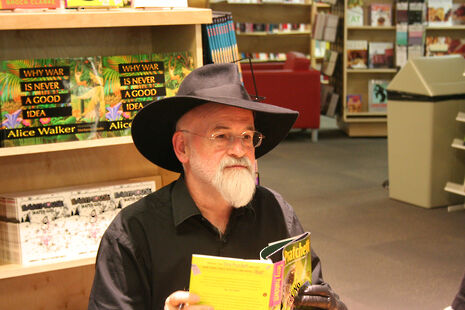Why I miss Terry Pratchett
A week on from the author’s death, Hazel Lawrence makes sense of its effect on her

Last week, as some fantasy fans among us will know, the author Terry Pratchett died. I have been reading Terry Pratchett’s books (of which there are over 70) for approximately 13 years and the news of Pratchett’s passing profoundly affected me. Since March 12 I have been attempting to express my emotions to my nearest and dearest (and a rather unfortunate ‘wrong place wrong time’ Waterstones employee) none of whom have read any of his work. Needless to say all my attempts have failed, frustratingly, and so the other day in the pub I decided to summarise for my witless friends exactly what I felt. I leant over my glass of wine, looked directly into one of my friend’s eyes and repeated the phrase ‘I am SO SAD’ about five times.
This is probably my first, and will likely be my most intense experience of feeling ‘celebrity loss’ where the death of a famous, never-met but admired individual causes a genuine emotional response. Pratchett was someone I felt very connected to, in part because of his unique writing style, so rich in his sharp sense of humour and observation. His personality features in every page. I once remember trying to describe to someone the feeling of reading a Pratchett book for the first time, and the best I could come up with was: "Imagine it's like catching up with an old friend, but you’re inside their head. And there’s magic." Reading a new Discworld is fresh and full of unexpected twists and turns (personally, I always find predicting the denouement of a Pratchett plot is harder than an Agatha Christie one) but also fantastically familiar.
No other writer I know has provided me with that feeling of excitement at reading each new novel, largely because so few writers have written so many. The fantasy world of Discworld (a flat disc-shaped planet that balances on the back of 4 elephants who in turn stand on the back of a giant sea turtle as it swims through space) has kept growing, opening up new places and characters as I’ve grown up. It’s never been finished, never stopped changing, breathing, and ‘living’ if you will — until now. The characters always existed in the present, with something on their future horizons. For Commander Samuel Vimes of the Night Watch it was more (unwanted) adventures, for cowardly ‘Wizzard’ Rincewind it was something else to run away from, for the Orangutan Librarian there was always another banana to eat, and for Granny Weatherwax there was Borrowing to get on with. Each character exists now as a finished identity, their actions completed, meaning I have to confront the fact that everything ends. Perhaps what’s worse is that I’ll never know the full lyrics to ‘A Wizard’s Staff has a Knob on the End’.
As I’ve already said, Pratchett’s personality pervades his work, which highlights what is perhaps the most emotional issue for Pratchett fans: his confrontation of death. In the fantastical worlds he populated with ridiculous and mythological characters, Pratchett also added Death. Death is a skeletal figure dressed, rather obviously, in a black cape and carrying a scythe who rides a white horse named, somewhat less obviously, Binky. He appears in 38 of the 40 published Discworld novels and is one of the funniest and gently thought-provoking characters in the whole universe. Whether he’s causing havoc by going on holiday in Reaper Man, or taking a human apprentice in Mort, or even getting slightly annoyed at being summoned by Wizards, his presence in the novels are part of Pratchett’s humorous exploration of the nature of humanity. The relationship between the character of Death and Pratchett is one fans have appropriated as a touching shared expression of loss. If you want, you can join them here by petitioning Death to bring Pratchett back.
This inevitably leads us to Pratchett’s own death which he was forced to confront years before by a diagnosis of Posterior Cortical Atrophy, an atypical variant of Alzheimer's. From his diagnosis right up to the year of his death, Pratchett was educating and campaigning for more research and better legislation for the dying. From documentaries to public speeches, Pratchett knew his death was coming, and faced it. It’s interesting to see in his work that Death enters from book one, and that even early on as Pratchett created new worlds he did not shy away from the unescapable end. I don’t think I’m alone in reasoning that this is one of the reasons why I enjoyed his books so much, why I still will, and why I will miss his creativity in modern fiction. Terry Pratchett never belittled the experience of being human, and while he entertainined me he showed me that the experience of being human is as expansive as it is enjoyable. Long may he live on in the clacks…
 News / Fitz students face ‘massive invasion of privacy’ over messy rooms23 April 2024
News / Fitz students face ‘massive invasion of privacy’ over messy rooms23 April 2024 News / Cambridge University disables comments following Passover post backlash 24 April 2024
News / Cambridge University disables comments following Passover post backlash 24 April 2024 Comment / Gown vs town? Local investment plans must remember Cambridge is not just a university24 April 2024
Comment / Gown vs town? Local investment plans must remember Cambridge is not just a university24 April 2024 Comment / Does Lucy Cavendish need a billionaire bailout?22 April 2024
Comment / Does Lucy Cavendish need a billionaire bailout?22 April 2024 Interviews / Gender Agenda on building feminist solidarity in Cambridge24 April 2024
Interviews / Gender Agenda on building feminist solidarity in Cambridge24 April 2024





